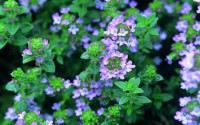Making more of medicinal plants: cures for all ills
- Date
- 13 Jan 2015
- Start time
- 7:30 PM
- Venue
- Tempest Anderson Hall
- Speaker
- Prof. Ian Graham

Making more of medicinal plants: cures for all ills
Professor Ian Graham, Head of Department of Biology and Chair of Biochemical Genetics, University of York
For around 475 million years plants have been waging chemical warfare on planet earth to fight off attacks from herbivores and pathogens, and to protect themselves from often hostile environments. The vast array of chemicals that have evolved during this time also provide plants with medicinal properties that human civilisation has relied on for millennia. This lecture will focus on two of the most important medicinal plants in use today. Artemisia annua produces a complex terpene called artemisinin, which kills the malaria parasite and is the most effective drug in the fight against malaria. Opium poppy remains the primary source of morphinan based painkillers in use today and also produces the anticancer alkaloid noscapine. We will look at how plants have evolved to produce these complex molecules and we will also consider the prospect of returning to natural sources for drug discovery given that laboratory based synthetic chemistry approaches to drug discovery have largely failed.
Report
Professor Graham began with a tribute to Yorkshire Scientist Richard Spruce, (1817-1893). Spruce collected cinchona plants, from which the anti-malaria drug quinine was prepared. Quinine is no longer effective, but the plant Artemisia annua has been found to produce a terpene called artemisinin, which kills the malaria parasite.
In the 1990s, efforts to synthesise new drugs without using plants proved disappointing, and the focus has returned to investigating traditional remedies. Plant evolution over 500 million years gave rise to a rich source of molecules, most as yet unexploited. Improved methods of analysing DNA and the use of computers enable these to be investigated much more efficiently
CNAP is developing new strains of Artemisia to provide a stable and plentiful supply of artemisinin. Additionally, their work on the opium poppy, source of painkillers codeine and morphine, revealed the pathway for synthesis of the anticancer alkaloid noscapine, making this drug more accessible.
Margaret Leonard